- Home
- Joseph Conrad
Victory (Echo Library) Page 2
Victory (Echo Library) Read online
Page 2
Or perhaps they had only migrated to the other big cafe, on the other side of the Place de la Comedie. It is very possible. I did not go across to find out. It was my perfect idleness that had invested the girl with a peculiar charm, and I did not want to destroy it by any superfluous exertion. The receptivity of my indolence made the impression so permanent that when the moment came for her meeting with Heyst I felt that she would be heroically equal to every demand of the risky and uncertain future. I was so convinced of it that I let her go with Heyst, I won't say without a pang but certainly without misgivings. And in view of her triumphant end what more could I have done for her rehabilitation and her happiness?
1920. J. C.
VICTORY: AN ISLAND TALE
PART ONE
CHAPTER ONE
There is, as every schoolboy knows in this scientific age, a very close chemical relation between coal and diamonds. It is the reason, I believe, why some people allude to coal as "black diamonds." Both these commodities represent wealth; but coal is a much less portable form of property. There is, from that point of view, a deplorable lack of concentration in coal. Now, if a coal-mine could be put into one's waistcoat pocket—but it can't! At the same time, there is a fascination in coal, the supreme commodity of the age in which we are camped like bewildered travellers in a garish, unrestful hotel. And I suppose those two considerations, the practical and the mystical, prevented Heyst—Axel Heyst—from going away.
The Tropical Belt Coal Company went into liquidation. The world of finance is a mysterious world in which, incredible as the fact may appear, evaporation precedes liquidation. First the capital evaporates, and then the company goes into liquidation. These are very unnatural physics, but they account for the persistent inertia of Heyst, at which we "out there" used to laugh among ourselves—but not inimically. An inert body can do no harm to anyone, provokes no hostility, is scarcely worth derision. It may, indeed, be in the way sometimes; but this could not be said of Axel Heyst. He was out of everybody's way, as if he were perched on the highest peak of the Himalayas, and in a sense as conspicuous. Everyone in that part of the world knew of him, dwelling on his little island. An island is but the top of a mountain. Axel Heyst, perched on it immovably, was surrounded, instead of the imponderable stormy and transparent ocean of air merging into infinity, by a tepid, shallow sea; a passionless offshoot of the great waters which embrace the continents of this globe. His most frequent visitors were shadows, the shadows of clouds, relieving the monotony of the inanimate, brooding sunshine of the tropics. His nearest neighbour—I am speaking now of things showing some sort of animation—was an indolent volcano which smoked faintly all day with its head just above the northern horizon, and at night levelled at him, from amongst the clear stars, a dull red glow, expanding and collapsing spasmodically like the end of a gigantic cigar puffed at intermittently in the dark. Axel Heyst was also a smoker; and when he lounged out on his veranda with his cheroot, the last thing before going to bed, he made in the night the same sort of glow and of the same size as that other one so many miles away.
In a sense, the volcano was company to him in the shades of the night—which were often too thick, one would think, to let a breath of air through. There was seldom enough wind to blow a feather along. On most evenings of the year Heyst could have sat outside with a naked candle to read one of the books left him by his late father. It was not a mean store. But he never did that. Afraid of mosquitoes, very likely. Neither was he ever tempted by the silence to address any casual remarks to the companion glow of the volcano. He was not mad. Queer chap—yes, that may have been said, and in fact was said; but there is a tremendous difference between the two, you will allow.
On the nights of full moon the silence around Samburan—the "Round Island" of the charts—was dazzling; and in the flood of cold light Heyst could see his immediate surroundings, which had the aspect of an abandoned settlement invaded by the jungle: vague roofs above low vegetation, broken shadows of bamboo fences in the sheen of long grass, something like an overgrown bit of road slanting among ragged thickets towards the shore only a couple of hundred yards away, with a black jetty and a mound of some sort, quite inky on its unlighted side. But the most conspicuous object was a gigantic blackboard raised on two posts and presenting to Heyst, when the moon got over that side, the white letters "T. B. C. Co." in a row at least two feet high. These were the initials of the Tropical Belt Coal Company, his employers—his late employers, to be precise.
According to the unnatural mysteries of the financial world, the T. B. C. Company's capital having evaporated in the course of two years, the company went into liquidation—forced, I believe, not voluntary. There was nothing forcible in the process, however. It was slow; and while the liquidation—in London and Amsterdam—pursued its languid course, Axel Heyst, styled in the prospectus "manager in the tropics," remained at his post on Samburan, the No. 1 coaling-station of the company.
And it was not merely a coaling-station. There was a coal-mine there, with an outcrop in the hillside less than five hundred yards from the rickety wharf and the imposing blackboard. The company's object had been to get hold of all the outcrops on tropical islands and exploit them locally. And, Lord knows, there were any amount of outcrops. It was Heyst who had located most of them in this part of the tropical belt during his rather aimless wanderings, and being a ready letter-writer had written pages and pages about them to his friends in Europe. At least, so it was said.
We doubted whether he had any visions of wealth—for himself, at any rate. What he seemed mostly concerned for was the "stride forward," as he expressed it, in the general organization of the universe, apparently. He was heard by more than a hundred persons in the islands talking of a "great stride forward for these regions." The convinced wave of the hand which accompanied the phrase suggested tropical distances being impelled onward. In connection with the finished courtesy of his manner, it was persuasive, or at any rate silencing—for a time, at least. Nobody cared to argue with him when he talked in this strain. His earnestness could do no harm to anybody. There was no danger of anyone taking seriously his dream of tropical coal, so what was the use of hurting his feelings?
Thus reasoned men in reputable business offices where he had his entree as a person who came out East with letters of introduction—and modest letters of credit, too—some years before these coal-outcrops began to crop up in his playfully courteous talk. From the first there was some difficulty in making him out. He was not a traveller. A traveller arrives and departs, goes on somewhere. Heyst did not depart. I met a man once—the manager of the branch of the Oriental Banking Corporation in Malacca—to whom Heyst exclaimed, in no connection with anything in particular (it was in the billiard-room of the club):
"I am enchanted with these islands!"
He shot it out suddenly, a propos des bottes, as the French say, and while chalking his cue. And perhaps it was some sort of enchantment. There are more spells than your commonplace magicians ever dreamed of.
Roughly speaking, a circle with a radius of eight hundred miles drawn round a point in North Borneo was in Heyst's case a magic circle. It just touched Manila, and he had been seen there. It just touched Saigon, and he was likewise seen there once. Perhaps these were his attempts to break out. If so, they were failures. The enchantment must have been an unbreakable one. The manager—the man who heard the exclamation—had been so impressed by the tone, fervour, rapture, what you will, or perhaps by the incongruity of it that he had related the experience to more than one person.
"Queer chap, that Swede," was his only comment; but this is the origin of the name "Enchanted Heyst" which some fellows fastened on our man.
He also had other names. In his early years, long before he got so becomingly bald on the top, he went to present a letter of introduction to Mr. Tesman of Tesman Brothers, a Sourabaya firm—tip-top house. Well, Mr. Tesman was a kindly, benevolent old gentleman. He did not know what to make of that caller. After tellin
g him that they wished to render his stay among the islands as pleasant as possible, and that they were ready to assist him in his plans, and so on, and after receiving Heyst's thanks—you know the usual kind of conversation—he proceeded to query in a slow, paternal tone:
"And you are interested in—?"
"Facts," broke in Heyst in his courtly voice. "There's nothing worth knowing but facts. Hard facts! Facts alone, Mr. Tesman."
I don't know if old Tesman agreed with him or not, but he must have spoken about it, because, for a time, our man got the name of "Hard Facts." He had the singular good fortune that his sayings stuck to him and became part of his name. Thereafter he mooned about the Java Sea in some of the Tesmans' trading schooners, and then vanished, on board an Arab ship, in the direction of New Guinea. He remained so long in that outlying part of his enchanted circle that he was nearly forgotten before he swam into view again in a native proa full of Goram vagabonds, burnt black by the sun, very lean, his hair much thinned, and a portfolio of sketches under his arm. He showed these willingly, but was very reserved as to anything else. He had had an "amusing time," he said. A man who will go to New Guinea for fun—well!
Later, years afterwards, when the last vestiges of youth had gone off his face and all the hair off the top of his head, and his red-gold pair of horizontal moustaches had grown to really noble proportions, a certain disreputable white man fastened upon him an epithet. Putting down with a shaking hand a long glass emptied of its contents—paid for by Heyst—he said, with that deliberate sagacity which no mere water-drinker ever attained:
"Heyst's a puffect g'n'lman. Puffect! But he's a ut-uto-utopist."
Heyst had just gone out of the place of public refreshment where this pronouncement was voiced. Utopist, eh? Upon my word, the only thing I heard him say which might have had a bearing on the point was his invitation to old McNab himself. Turning with that finished courtesy of attitude, movement voice, which was his obvious characteristic, he had said with delicate playfulness:
"Come along and quench your thirst with us, Mr. McNab!"
Perhaps that was it. A man who could propose, even playfully, to quench old McNab's thirst must have been a utopist, a pursuer of chimeras; for of downright irony Heyst was not prodigal. And, may be, this was the reason why he was generally liked. At that epoch in his life, in the fulness of his physical development, of a broad, martial presence, with his bald head and long moustaches, he resembled the portraits of Charles XII., of adventurous memory. However, there was no reason to think that Heyst was in any way a fighting man.
CHAPTER TWO
It was about this time that Heyst became associated with Morrison on terms about which people were in doubt. Some said he was a partner, others said he was a sort of paying guest, but the real truth of the matter was more complex. One day Heyst turned up in Timor. Why in Timor, of all places in the world, no one knows. Well, he was mooning about Delli, that highly pestilential place, possibly in search of some undiscovered facts, when he came in the street upon Morrison, who, in his way, was also an "enchanted" man. When you spoke to Morrison of going home—he was from Dorsetshire—he shuddered. He said it was dark and wet there; that it was like living with your head and shoulders in a moist gunny-bag. That was only his exaggerated style of talking. Morrison was "one of us." He was owner and master of the Capricorn, trading brig, and was understood to be doing well with her, except for the drawback of too much altruism. He was the dearly beloved friend of a quantity of God-forsaken villages up dark creeks and obscure bays, where he traded for produce. He would often sail, through awfully dangerous channels up to some miserable settlement, only to find a very hungry population clamorous for rice, and without so much "produce" between them as would have filled Morrison's suitcase. Amid general rejoicings, he would land the rice all the same, explain to the people that it was an advance, that they were in debt to him now; would preach to them energy and industry, and make an elaborate note in a pocket-diary which he always carried; and this would be the end of that transaction. I don't know if Morrison thought so, but the villagers had no doubt whatever about it. Whenever a coast village sighted the brig it would begin to beat all its gongs and hoist all its streamers, and all its girls would put flowers in their hair and the crowd would line the river bank, and Morrison would beam and glitter at all this excitement through his single eyeglass with an air of intense gratification. He was tall and lantern-jawed, and clean-shaven, and looked like a barrister who had thrown his wig to the dogs.
We used to remonstrate with him:
"You will never see any of your advances if you go on like this, Morrison."
He would put on a knowing air.
"I shall squeeze them yet some day—never you fear. And that reminds me"—pulling out his inseparable pocketbook—"there's that So-and-So village. They are pretty well off again; I may just as well squeeze them to begin with."
He would make a ferocious entry in the pocketbook.
Memo: Squeeze the So-and-So village at the first time of calling.
Then he would stick the pencil back and snap the elastic on with inflexible finality; but he never began the squeezing. Some men grumbled at him. He was spoiling the trade. Well, perhaps to a certain extent; not much. Most of the places he traded with were unknown not only to geography but also to the traders' special lore which is transmitted by word of mouth, without ostentation, and forms the stock of mysterious local knowledge. It was hinted also that Morrison had a wife in each and every one of them, but the majority of us repulsed these innuendoes with indignation. He was a true humanitarian and rather ascetic than otherwise.
When Heyst met him in Delli, Morrison was walking along the street, his eyeglass tossed over his shoulder, his head down, with the hopeless aspect of those hardened tramps one sees on our roads trudging from workhouse to workhouse. Being hailed on the street he looked up with a wild worried expression. He was really in trouble. He had come the week before into Delli and the Portuguese authorities, on some pretence of irregularity in his papers, had inflicted a fine upon him and had arrested his brig.
Morrison never had any spare cash in hand. With his system of trading it would have been strange if he had; and all these debts entered in the pocketbook weren't good enough to raise a millrei on—let alone a shilling. The Portuguese officials begged him not to distress himself. They gave him a week's grace, and then proposed to sell the brig at auction. This meant ruin for Morrison; and when Heyst hailed him across the street in his usual courtly tone, the week was nearly out.
Heyst crossed over, and said with a slight bow, and in the manner of a prince addressing another prince on a private occasion:
"What an unexpected pleasure. Would you have any objection to drink something with me in that infamous wine-shop over there? The sun is really too strong to talk in the street."
The haggard Morrison followed obediently into a sombre, cool hovel which he would have distained to enter at any other time. He was distracted. He did not know what he was doing. You could have led him over the edge of a precipice just as easily as into that wine-shop. He sat down like an automaton. He was speechless, but he saw a glass full of rough red wine before him, and emptied it. Heyst meantime, politely watchful, had taken a seat opposite.
"You are in for a bout of fever, I fear," he said sympathetically.
Poor Morrison's tongue was loosened at that.
"Fever!" he cried. "Give me fever. Give me plague. They are diseases. One gets over them. But I am being murdered. I am being murdered by the Portuguese. The gang here downed me at last among them. I am to have my throat cut the day after tomorrow."
In the face of this passion Heyst made, with his eyebrows, a slight motion of surprise which would not have been misplaced in a drawing-room. Morrison's despairing reserve had broken down. He had been wandering with a dry throat all over that miserable town of mud hovels, silent, with no soul to turn to in his distress, and positively maddened by his thoughts; and suddenly he had stumbled o
n a white man, figuratively and actually white—for Morrison refused to accept the racial whiteness of the Portuguese officials. He let himself go for the mere relief of violent speech, his elbows planted on the table, his eyes blood-shot, his voice nearly gone, the brim of his round pith hat shading an unshaven, livid face. His white clothes, which he had not taken off for three days, were dingy. He had already gone to the bad, past redemption. The sight was shocking to Heyst; but he let nothing of it appear in his bearing, concealing his impression under that consummate good-society manner of his. Polite attention, what's due from one gentleman listening to another, was what he showed; and, as usual, it was catching; so that Morrison pulled himself together and finished his narrative in a conversational tone, with a man-of-the-world air.
"It's a villainous plot. Unluckily, one is helpless. That scoundrel Cousinho—Andreas, you know—has been coveting the brig for years. Naturally, I would never sell. She is not only my livelihood; she's my life. So he has hatched this pretty little plot with the chief of the customs. The sale, of course, will be a farce. There's no one here to bid. He will get the brig for a song—no, not even that—a line of a song. You have been some years now in the islands, Heyst. You know us all; you have seen how we live. Now you shall have the opportunity to see how some of us end; for it is the end, for me. I can't deceive myself any longer. You see it—don't you?"

 Heart of Darkness
Heart of Darkness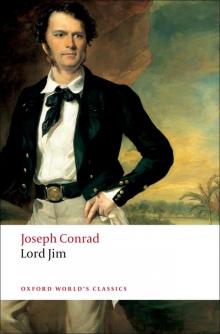 Lord Jim
Lord Jim The Nigger of the Narcissus (Echo Library)
The Nigger of the Narcissus (Echo Library) Victory (Dover Thrift Editions)
Victory (Dover Thrift Editions) Secret Agent
Secret Agent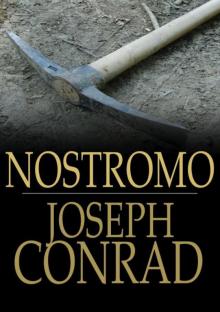 Nostromo
Nostromo Chance: A Tale in Two Parts
Chance: A Tale in Two Parts Youth
Youth Almayer's Folly
Almayer's Folly The Heart of Darkness and the Secret Sharer
The Heart of Darkness and the Secret Sharer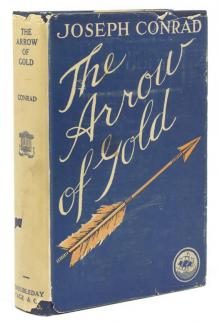 The Arrow of Gold: A Story Between Two Notes
The Arrow of Gold: A Story Between Two Notes The Rescue: A Romance of the Shallows
The Rescue: A Romance of the Shallows The Point Of Honor: A Military Tale
The Point Of Honor: A Military Tale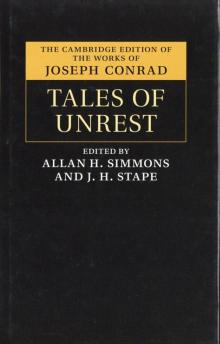 Tales of Unrest
Tales of Unrest Under Western Eyes
Under Western Eyes Gaspar Ruiz
Gaspar Ruiz A Set of Six
A Set of Six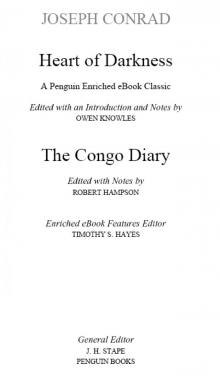 Heart of Darkness and the Congo Diary (Penguin Classics)
Heart of Darkness and the Congo Diary (Penguin Classics) Heart of Darkness and Selected Short Fiction
Heart of Darkness and Selected Short Fiction Typhoon
Typhoon Youth, a Narrative
Youth, a Narrative Tomorrow
Tomorrow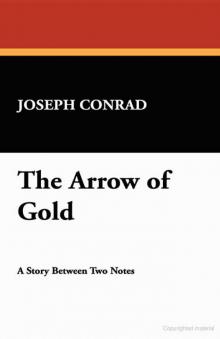 The Arrow of Gold
The Arrow of Gold The Shadow Line: A Confession
The Shadow Line: A Confession The Rescue
The Rescue Victory (Echo Library)
Victory (Echo Library) The Brute
The Brute Romance
Romance A Personal Record
A Personal Record Lord Jim: A Tale
Lord Jim: A Tale Heart of Darkness and Selected Short Fiction (Barnes & Noble Classics Series)
Heart of Darkness and Selected Short Fiction (Barnes & Noble Classics Series) Within the Tides
Within the Tides The Secret Sharer and Other Stories
The Secret Sharer and Other Stories Falk
Falk Heart of Darkness and The Secret Sharer
Heart of Darkness and The Secret Sharer Chance
Chance An Anarchist
An Anarchist The Secret Agent: A Simple Tale
The Secret Agent: A Simple Tale The Secret Agent
The Secret Agent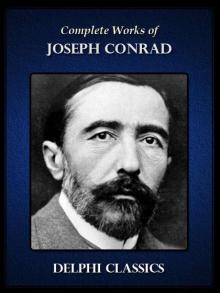 Complete Works of Joseph Conrad (Illustrated)
Complete Works of Joseph Conrad (Illustrated)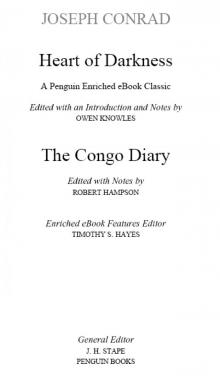 Heart of Darkness and the Congo Diary
Heart of Darkness and the Congo Diary Notes on Life & Letters
Notes on Life & Letters Typhoon (Single Story)
Typhoon (Single Story)